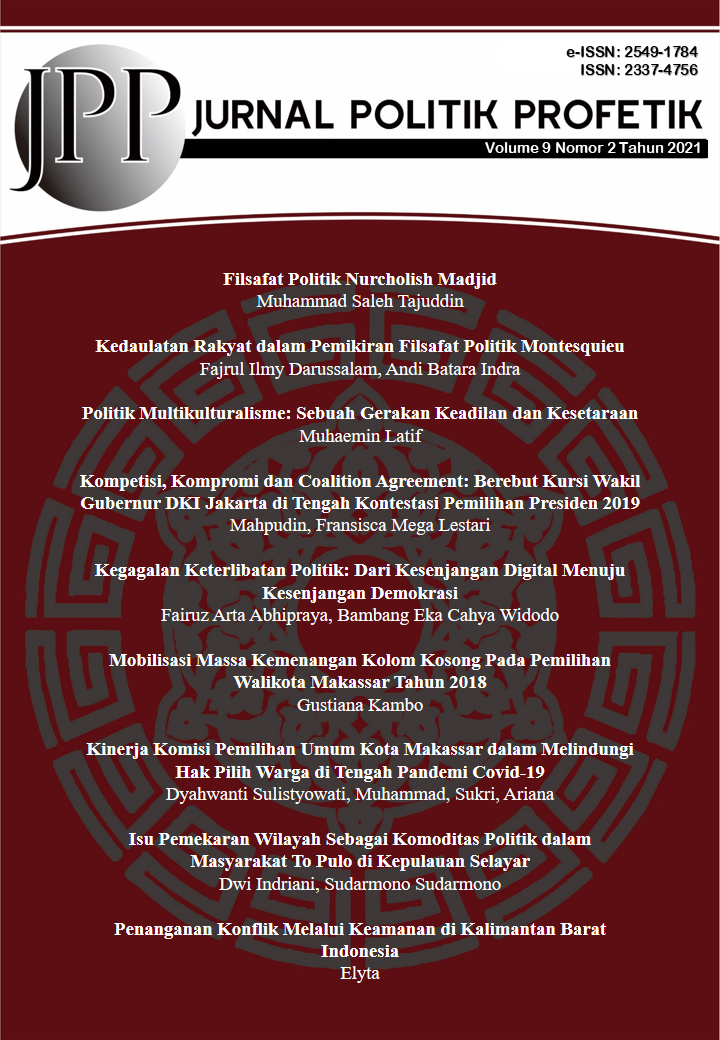KEGAGALAN KETERLIBATAN POLITIK: DARI KESENJANGAN DIGITAL MENUJU KESENJANGAN DEMOKRASI
Abstract
Almost all political scholars have proven that Facebook has an important role in seizing the public’s political engagement in political campaign agenda. However, the differences in voter segmentation and the internet capacity do not make all cases are all the same phenomenon. This study used a mixed research method to find out the Facebook's role in shaping the online political engagement from the Bantul community to the official accounts of candidates in Bantul Local Election 2020 for Bantul regency. The result of this research led to a conclusion that there was a digital divide that resulting in the democratic divide in the Bantul Regency. This democratic divide caused the lack of understanding of the local community towards the issue raised by the candidates. Furthermore, all the political candidates in the Bantul regency that competed in the local election 2020 had used symbolic issues for their political campaign agenda in this election such as religion-tolerance and other cultural-social issues.
Downloads
References
Acilar, Ali. “Exploring the Aspects of Digital Divide in a Developing Country” dalam Issues in Informing Science and Information Technology, Vol. 8 No. 1 (2011), h. 231-244.
Bernard, Stephen R. “Digitally Enabled Social Change: Activism in the Internet Age” dalam New Media & Society, Vol. 41, No.4 (2012), h. 894-895.
Boulianne, Shelley. “Social Media Use and Participation: A Meta-Analysis of Current Research” dalam Information Communication and Society, Vol. 18, No. 5 (2015), h. 524-538.
Brandão, Catarina. Qualitative Data Analysis with NVivo. 2nd Ed. Coloradi: Sage Publishing, 2015.
Creswell, John W. Research Design : Pendekatan Metode Kualitatif, Kuantitatif, dan Campuran. 4th ed. Yogyakarta: Pustaka Pelajar, 2014.
Dahlgren, Peter. “The Internet, Public Spheres, and Political Communication: Dispersion and Deliberation” dalam Political Communication, Vol.22, No.5 (2005), h. 147-162.
--------. Media and Political Engagement: Citizens, Communication and Democracy. Cambridge: Cambridge University Press, 2009.
Dijk, Jan A.G.M van. The Deepening Divide: Inequality In The Information Society. London: Sage, 2005.
Gaventa, John. “Finding the Spaces for Change: A Power Analysis” dalam IDS Bulletin, Vol. 37, No.6 (2006), h. 23-33.
Gunkel, David J. “Second Thoughts: Toward a Critique of the Digital Divide” dalam New Media & Society, Vol.5, No. 4 (2003), h. 499-522.
Hidayatillah, Rumaisah, Mirwan, Mohammad Hakam & Aryo Nugroho. “Levels of Political Participation Based on Naive Bayes Classifier” dalam IJCCS (Indonesian Journal of Computing and Cybernetics Systems), Vol.13, No.1 (2019), h. 73-82.
Hofmann, Sara, Daniel Beverungen, Michael Räckers, & Jörg Becker. “What Makes Local Governments’ Online Communications Successful? Insights from a Multi-Method Analysis of Facebook” dalam Government Information Quarterly. Vol. 30, No. 2 (2013), h. 387-396.
Howe, Neil & William Strauss, Millenials Rising: The Next Great Generation. New York: Vintage Book, 2000.
Kim, Daejoong, Heasun Chun, Youngsun Kwak, & Yoonjae Nam. “The Employment of Dialogic Principles in Website, Facebook, and Twitter Platforms of Environmental Nonprofit Organizations” dalam Social Science Computer Review, Vol. 32, No.5 (2014), h. 590-605.
Miles, Matthew B. & A. Michael Huberman. Qualitative Data Analysis: A Sourcebook of New Method. Thousand Oaks, CA: Sage, 1994.
Morissan. “Media Sosial Dan Partisipasi Sosial Di Kalangan Generasi Muda” dalam Jurnal Visi Komunikasi Vol. 13, No.1 13 (2014), h. 50–68;
Mossberger, Karen, Caroline J. Tolbert & Michele Gilbert. “Race, place, and information technology” dalam Urban Affairs Review, Vol.41, No.5, (2006), h. 583–620.
Nasrullah, Rulli. Media Sosial: Perspektif Komunikasi, Budaya, dan Sosioteknologi. Bandung: Simbiosa Rekatama Media, 2015.
Norris, Pippa. “The Worldwide Digital Divide: Information Poverty, the Internet and Development” dalam Annual Meeting of the Political Studies Association of the UK, London School of Economics and Political Science (2001).
Papagiannidi, Savvas & Danae Manika. “Political Participation and Engagement via Different Online and Offline Channels” dalam International Journal of E-Business Research, Vol. 12 , No. 4 (2016), h. 1-22.
Petrocik, John R. “Issue Ownership in Presidential Elections, with a 1980 Case Study” dalam American Journal of Political Science, Vol.40, No.3 (1996), h. 825-850.
Pontes, Ana, Matt Henn & Mark D. Griffiths. “Towards a Conceptualization of Young People’s Political Engagement: A Qualitative Focus Group Study” dalam Societies, Vol. 8, No.1 (2018), h. 1-17.
Prasatya, Andrew Citra. “The Role Of Social Media in Indonesia’s 2014 Presidential Election Campaign” dalam Jurnal Ilmiah Universitas Bakrie, Vol.4, No.1 (2015).
Quintelier, Ellen & Yannis Theocharis. “Online Political Engagement, Facebook, and Personality Traits” dalam Social Science Computer Review, Vol.31, No.3 (2013), h. 280-290.
Rojas, Hernando & Eulalia Puig-I-Abril. “Mobilizers Mobilized: Information, Expression, Mobilization and Participation in the Digital Age” dalam Journal of Computer-Mediated Communication, Vol. 14, No.4 (2009), h. 904-927.
Ward, Janelle. “Reaching Citizens Online” dalam Information, Communication & Society. Vol. 14, No.6 (2011), h. 917-936.
Website
Baines, Paul. “Political Marketing Has Lessons for Business Schools” dalam https://www.ft.com/content/e58afb24-2755-11e2-abcb-00144feabdc0 diakses 1 April 2021.
Khasni, Iwan Al. “Nomor Urut Calon Bupati Pilkada Bantul, Halim-Joko 1 Dan Suharsono-Totok 2” dalam https://jogja.tribunnews.com/2020/09/24/nomor-urut-calon-bupati-pilkada-bantul-halim-joko-1-dan-suharsono-totok-2 diakses 1 April 2021.
Wawancara
D. Radjud Kasworo, Ketua Tim Sukses 01 Pilkada Bantul 2020, wawancara, 14 November 2020.
Darwin, Ketua Tim Sukses 02 Pilkada Bantul 2020, wawancara, 16 November 2020.















